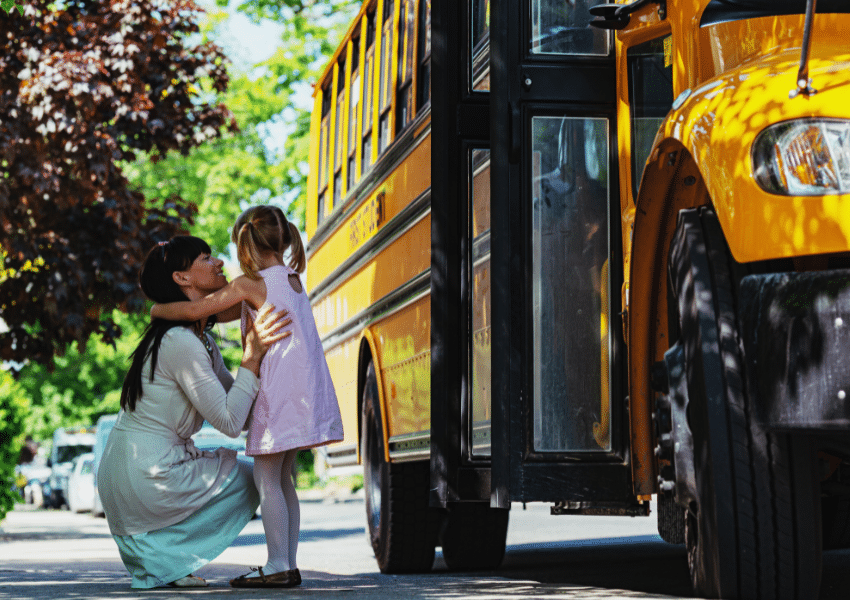The first day of school can feel like stepping onto a stage—new faces, new routines, and a swirl of emotions. For kids, it’s both exciting and nerve-wracking; for parents, it’s a delicate balance of encouragement and letting go. By helping your child manage those first-day jitters, build independence, and embrace challenges with a growth mindset, you can set the tone for a year filled with confidence and curiosity.
Here are some simple ways to help your child feel ready—emotionally and practically—for the year ahead.
Listen—Really Listen—to Your Child
Back-to-school season is a big transition, and change can be unsettling. Ask your child how they’re feeling about the new year. Are they excited to see friends? Nervous about a new teacher? Unsure about tougher schoolwork?
Validate those feelings. Let them know that it’s normal to feel a mix of emotions—and that even teachers feel that way sometimes. For younger kids, support might mean extra hugs, a comforting meal, or a favorite bedtime story. For older kids, try meditation, a walk together, or a phone call with a friend. The key is to ask what they need and follow their lead.
Help Them Acclimate Early
If your child is starting at a new school, attend an open house or schedule a tour so they can see the space beforehand. Arrange to meet the teacher(s) if possible. Encourage reconnecting with school friends before the first day. You might even want to join the parent-teacher association to connect with other families.
Build Skills Before Day One
Help your child feel ready for both academics and logistics.
- For middle schoolers, practice locker combinations. Buy an inexpensive combination lock for hands-on practice at home.
- Role-play scenarios like asking a teacher for help, changing classes, or joining a group activity.
- Work on skills like time management, organization, or social confidence.
Support Sleep and Nutrition
Kids learn and cope better when they’re well-rested and well-fed.
- Aim for 9–12 hours of sleep for younger kids and 8–10 hours for teens.
- Create a calming bedtime routine—dim lights, no screens and quiet activities like reading.
- In the morning, serve a balanced breakfast with protein, whole grains, and fruit, and pack healthy snacks to keep energy steady.
- Don’t forget a water bottle to stay hydrated throughout the day.
Make Sure They’re Fully Prepared
A little preparation goes a long way toward easing first-day nerves and setting your child up for success. Involve them in the process so they feel invested and ready to start strong.
- Finish summer assignments early to avoid last-minute stress.
- Shop together for school supplies so they can pick items they’re excited to use.
- Choose back-to-school clothes Let them select outfits that are comfortable and help them feel confident.
- See our money-saving tips for back-to-school shopping.
Ease into the New Routine
Talk through the school-day schedule for the whole family, from morning wakeups to after-school activities. A week before school starts, begin shifting bedtimes and wakeup times so the first day isn’t a shock.
Plan for a stress-free school morning:
- Lay out the first-day outfit (let kids choose).
- Pack the backpack and lunch.
- Allow plenty of time for dressing, hygiene, and breakfast.
Teach Positive Self-Talk
Help your child manage stress with healthy coping tools. Teach them a positive mantra, such as “I am strong. I belong. I can do this all day long” or “I am brave. I am bright. I can shine with all my might.” Have them say it out loud in front of a mirror as part of morning routine. Deep breathing, stretching, or quick mindfulness exercises can help calm first-day nerves. Child-friendly meditation apps, soothing soundscapes, or bedtime stories can also work wonders.
Manage Separation Anxiety
For younger children, reassure them that school is a normal and important part of life. Let them know exactly when you’ll be back for pickup—it’s comforting for kids to have a clear mental timeline.
Foster Age-Appropriate Independence
Small, age-appropriate responsibilities help kids feel proud, capable, and ready to take on more as they grow.
- Younger children can carry their own backpack and lunch.
- Older students can also make their lunch and plan their homework schedule.
- Remind kids about back-to-school traffic safety.
Create a Relationship Map
Draw a map with your child at the center, surrounded by trusted adults at school—teachers, counselors, aides—who can help. Knowing exactly who to go to makes asking for help less intimidating.
Check in with your child
At dinner or bedtime, ask open-ended questions like: “What made you smile today?” or “What was tricky?” These prompt more thoughtful answers than “How was your day?”
Watch for Signs of Struggle
If your child shows ongoing signs such as unusual sleep issues, irritability, poor concentration, low energy, loss of appetite, headaches, or frequent tears, consider reaching out to a school counselor or therapist for additional support.
By blending emotional support, practical preparation, and opportunities for independence, you can help your child start the school year with confidence and curiosity—ready to take on whatever comes their way.
This article is furnished by California Casualty, providing auto and home insurance to educators, law enforcement officers, firefighters, and nurses. Get a quote at 1.866.704.8614 or www.calcas.com.
- How to Properly Pack Your Fridge - February 24, 2026
- Staying in Control with Driver Assist - February 13, 2026
- Inexpensive Romantic Ways to Say “I Love You” - February 11, 2026

